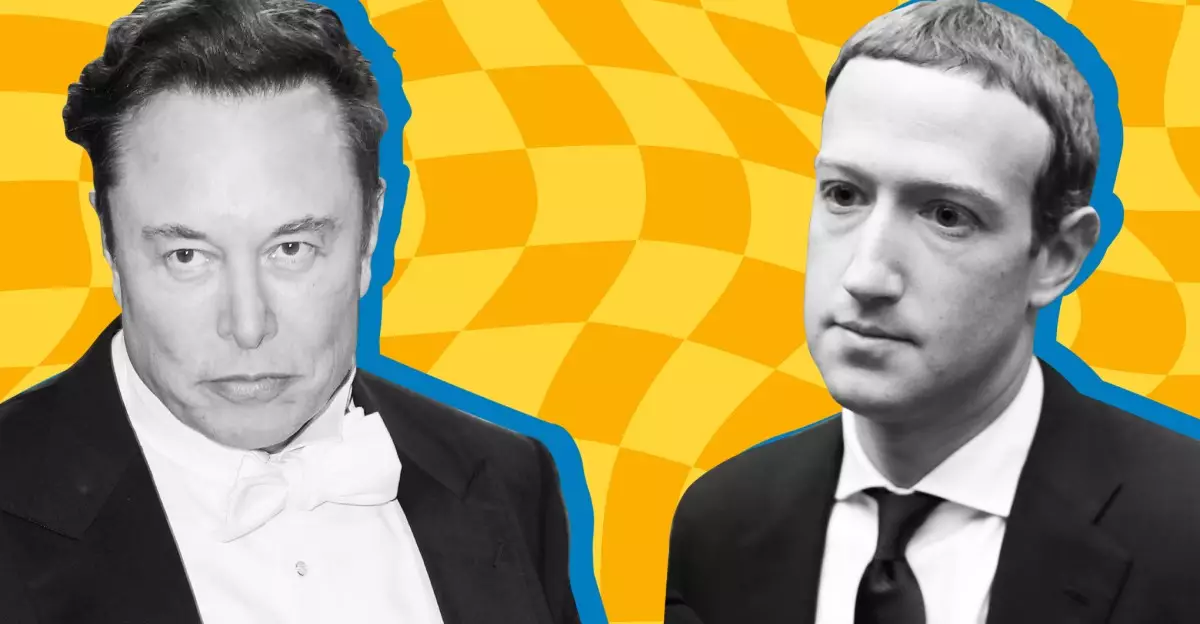In a bizarre twist of fate, a peculiar series of events unfolded in California, where the crosswalk buttons of three cities erupted into a kaleidoscope of AI-fueled satire. The voices of none other than Elon Musk and Mark Zuckerberg—two titans of the tech world—were reportedly hijacked to lampoon their public personas. As someone who closely monitors the blending of technology and culture, I’m equal parts entertained and concerned by this audacious stunt. The incident raises broader questions about the implications of AI voice cloning and our culture’s relationship with influential figures.
The phenomenon of AI-cloned voices stepping into the public sphere, albeit in a comedic manner, reflects a turning point in how we consume and interact with technology. Instead of merely being entertainment, these hacked voices served as a medium for social commentary. Imagine, for a moment, Musk’s voice pleading, “Can we be friends?” or Zuckerberg taking a jibe at his own corporation’s beleaguered reputation. While the motives behind this prank may come off as light-hearted, the implications of using AI cloning to impersonate individuals—regardless of their notoriety—could pose genuine ethical dilemmas.
The Hacked Humor: What It Says About Society
At the heart of this incident lies a clever yet jarring use of technology for satire. The hacked crosswalks became a stage for mocking the very realities that Musk and Zuckerberg embody. While these tech leaders have found themselves under scrutiny for their questionable decisions—whether it be Tesla’s roller-coaster journey or Facebook’s myriad controversies—their very voices were turned against them. This comedic exposure is a telling reflection of the public’s discontent and skepticism towards those who wield substantial power in the digital age.
On the one hand, one could argue that this act of mischief is an example of the thriving spirit of free speech and satire, giving the public a humorous outlet against figures often deemed untouchable. It’s a 21st-century form of public mockery—like how jesters once circulated in royal courts. On the other hand, this incident serves as a cautionary tale, illuminating the darker facets of AI technology, where voice cloning and identity theft can morph into tools for deception and manipulation beyond comedic effect.
The Dual Faces of AI: Mischief and Ethics
While the pranksters behind the AI-cloned voices may have had no malicious intent, the event opens a Pandora’s box of ethical considerations. The very technology enabling such satire—AI and machine learning—has already faced skepticism regarding misinformation and identity theft. Utilizing it to create hyper-realistic vocal clones encourages a slippery slope toward irresponsibility, where the lines between reality and fabrication blur.
What happens when voice cloning is used to propagate false narratives or harmful ideologies? If we can construct convincing replicas of public figures’ voices, what would stop someone from leveraging this technology for malicious purposes? As amusing as these voice samples may be, they are not a harmless form of entertainment; they are a reminder that the technosphere is fraught with perils we have yet to fully navigate.
Furthermore, the comedy stitches together a poignant thread about the alienation we feel towards celebrities and tech giants who often seem disconnected from the public they serve. Musk and Zuckerberg, both prominent architects of the modern digital landscape, have frequently found themselves embroiled in controversies that question their integrity. Their digital mockeries highlight this dissonance, albeit with a playful twist. The reactions could very well spawn movements for accountability, inspiring the public to confront these figures not with hostility, but with humor and creativity.
Artistry Meets Technology: A New Era of Expression
The marriage of comedy and innovative technology has cultivated a vibrant new form of artistic expression. Making light of Musk’s existential musings about friendship or Zuckerberg’s undisguised self-awareness about his company’s impact on society invites audiences to engage with these subjects critically while chuckling at their absurdities.
This incident is a compelling testament to how technology can be wielded creatively to initiate dialogue about societal and ethical issues while simultaneously delivering humor. It’s a digitally formulated caricature that entertains and provides social commentary, echoing through California’s streets and the internet alike. How will we navigate this new terrain? The possibilities are endless, but the conversations ignited by such events—around technology, ethics, and artistry—could shape our future.
Thus, while the prank appeared to be an amusing episode of technological tomfoolery, it presents an opportunity for deeper insights into our relationship with technology, power, and the perplexing world we inhabit. Each synthesized chuckle from an AI-voiced Musk or Zuckerberg serves as both a mirror and a window—reflecting our own sentiments while offering glimpses into a ludicrous yet poignant future.


Leave a Reply